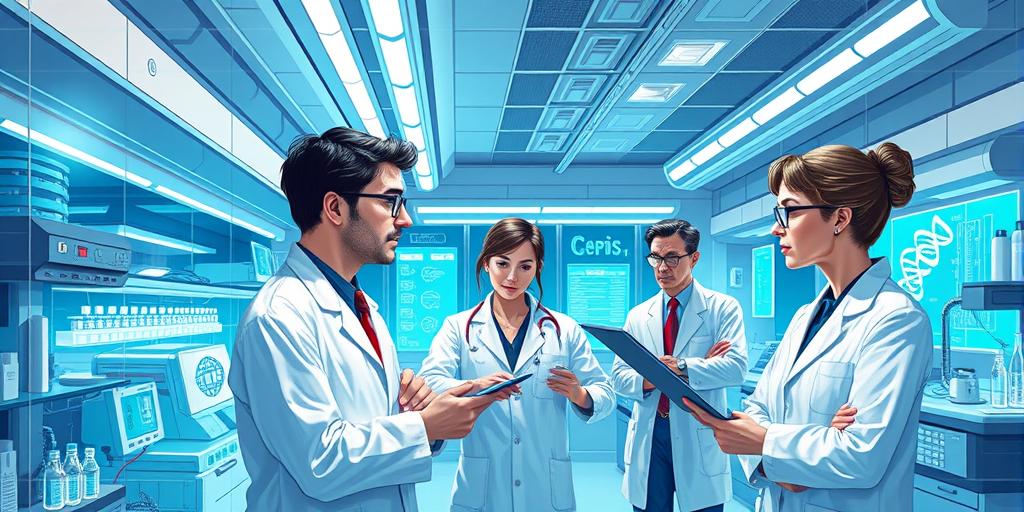Are you ready to dive into the groundbreaking world of genetic engineering? CRISPR technology is revolutionizing American medicine, offering unprecedented potential to treat and even cure diseases once considered incurable. From gene therapy's amazing advancements to the ethical considerations that come with manipulating our very DNA, this blog post will explore everything you need to know about CRISPR in the U.S. Prepare to be amazed by the possibilities and intrigued by the complexities of this incredible scientific breakthrough!
CRISPR: A Game-Changer in American Medicine
CRISPR-Cas9, often shortened to CRISPR, is a revolutionary gene-editing tool. Unlike previous methods, CRISPR offers unparalleled precision and efficiency, allowing scientists to target specific DNA sequences and modify them with remarkable accuracy. This has opened up a whole new world of possibilities in medical research and treatment. Imagine a future where genetic diseases, like cystic fibrosis and sickle cell anemia, are eradicated or easily treated; that's the potential of CRISPR. In the United States, clinical trials are underway to assess the effectiveness of CRISPR-based therapies for a wide range of conditions, from cancer to blindness. The implications are truly astonishing.
How Does CRISPR Work?
At its core, CRISPR utilizes a naturally occurring defense mechanism found in bacteria. This system essentially acts like a pair of molecular scissors, precisely cutting DNA at a targeted location. Scientists can then introduce edits—replacing, deleting, or inserting specific DNA sequences—to correct genetic defects or introduce new functionalities.
Current Applications of CRISPR in the U.S.
The applications of CRISPR in the United States are rapidly expanding. Early success has been seen in treating various cancers, blood disorders, and inherited diseases. Furthermore, research is being conducted to explore the use of CRISPR for gene therapy in treating other conditions. The most exciting recent advances include the development of CRISPR-based therapies for previously untreatable genetic diseases. This has sparked a renewed sense of hope for patients and their families who once felt hopeless about their prognosis.
Ethical Considerations and Future Directions
Despite its vast potential, CRISPR technology raises critical ethical concerns. The ability to alter the human genome raises questions about potential unforeseen consequences and the ethical implications of germline editing—modifying genes that can be passed on to future generations. Therefore, rigorous safety testing and regulatory oversight are crucial in the responsible development and application of CRISPR. Scientists and ethicists are actively engaged in discussions to ensure that the use of this powerful technology is ethically sound.
Addressing Ethical Challenges
The development and usage of CRISPR need to take into account the societal, legal, and ethical implications of this technology. These factors will play a central role in shaping the future of CRISPR research and its clinical applications. The potential to make precise gene editing on human embryos and germline cells presents exciting opportunities, but this also has to be reviewed carefully in order to meet the highest standards of ethics. Scientists and ethicists are collaborating to establish strong ethical guidelines and regulatory frameworks.
The Future of CRISPR in the US
The future of CRISPR in the US looks incredibly bright. Ongoing research promises further advancements in gene editing technology, leading to more effective and safer treatments. As research progresses and our understanding of the human genome deepens, we can anticipate even more remarkable breakthroughs in the near future. This might well include treatments for conditions previously considered untreatable, leading to a better quality of life for many.
CRISPR: A Glimpse into the Future
CRISPR technology represents one of the most significant advancements in medical science. Its potential to prevent, treat, and even cure a wide array of diseases is truly transformative. While ethical concerns remain, the ongoing research and development within the US are laying the groundwork for a future where genetic diseases might become a thing of the past. The journey toward realizing the full potential of CRISPR is ongoing, but the early success stories are undeniably inspiring. What was once science fiction is now rapidly becoming a tangible reality. We're witnessing the dawn of a new era in medicine—and the possibilities are truly limitless.
This revolutionary technology has the power to reshape healthcare as we know it. Don't miss out on this wave of medical innovation; stay tuned for further updates as CRISPR technology continues to change the medical landscape of America.
Ready to explore more about the groundbreaking advancements in gene editing? Click here to discover more!




